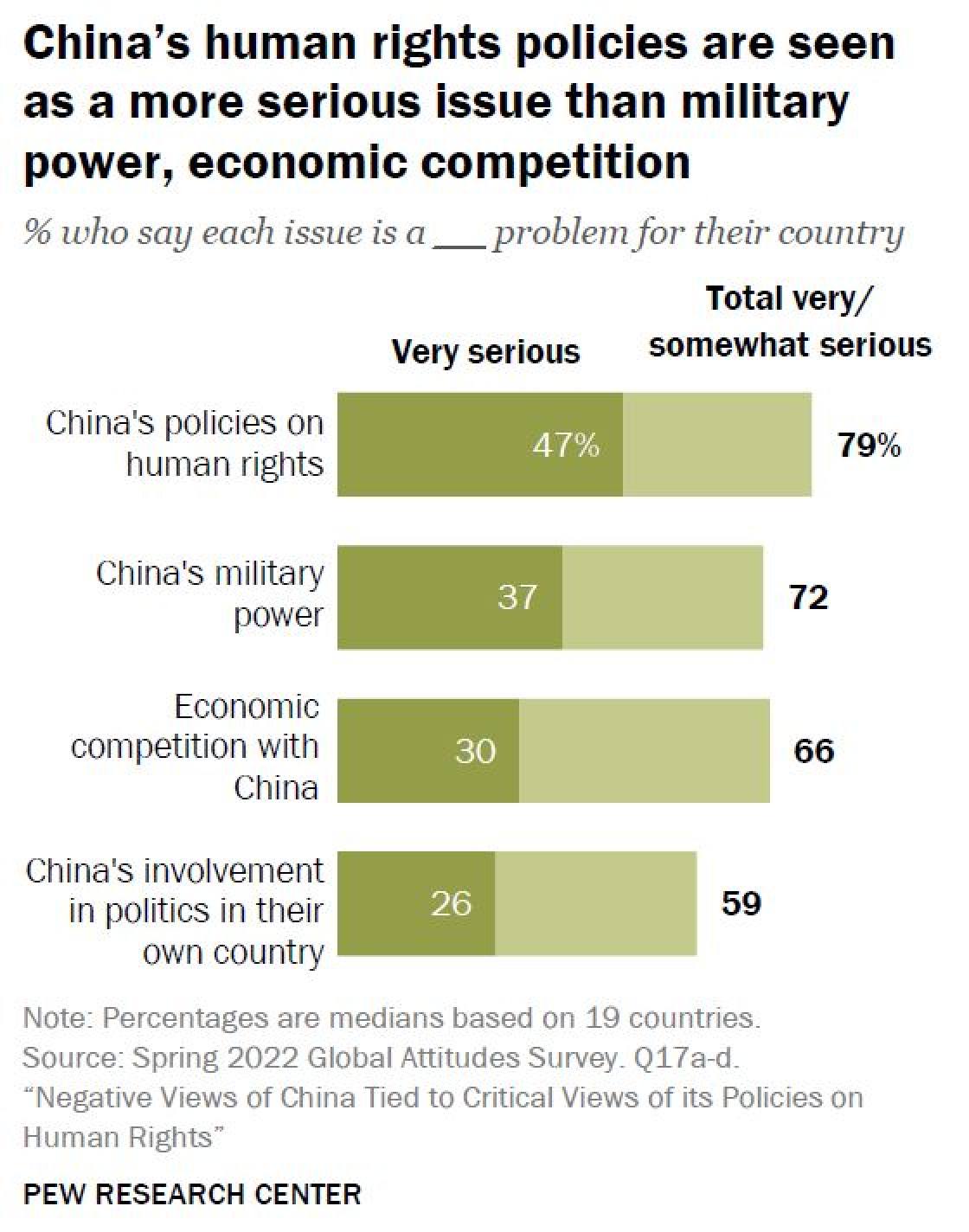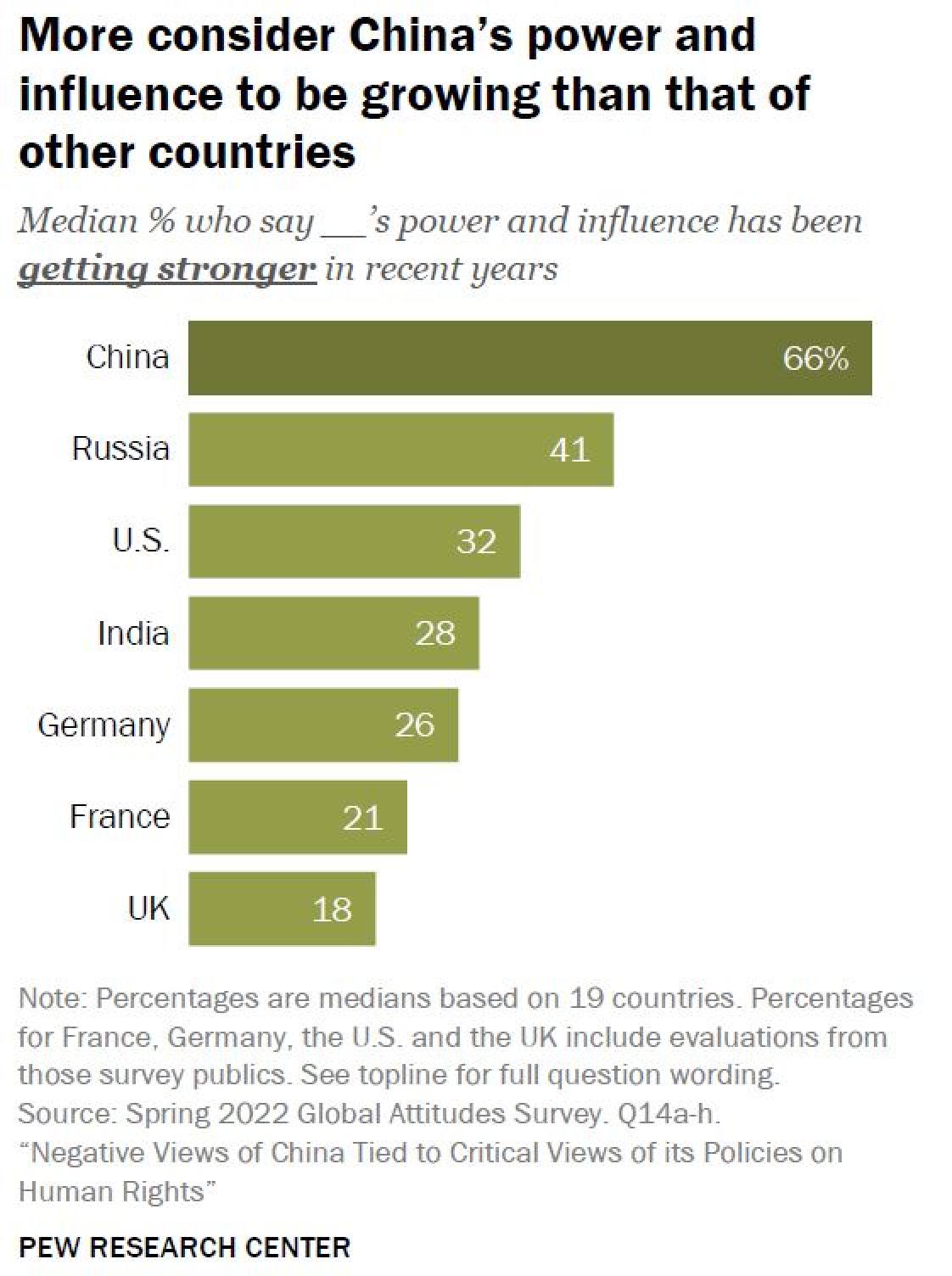
Beijing’s human rights policies drive unfavourable views of China, Pew survey finds
- Negative views of China rise in most of 19 countries surveyed, setting record highs in nations including the US, Canada, Germany and South Korea
- A median of 79 per cent of respondents in the 19 nations finds its rights policies a “serious problem”, more than Chinese military power or economic competition
Concerns about China’s human rights record dominated a new global public opinion poll released on Wednesday, dovetailing with increasingly unfavourable views of the country among many nations in North America and Europe.
Conducted by the Pew Research Centre, the survey of around 25,000 adults across 19 countries found that a median of 79 per cent of respondents in those nations considered China’s human rights policies a “serious problem”, outweighing concerns over Chinese military power, economic competition and China’s involvement in their own country.
The findings come as China faces growing scrutiny from large swathes of the international community over its treatment of ethnic minority groups in the country’s far west, as well as its moves to tighten control over Hong Kong.

Survey respondents largely agreed that governments should prioritise human rights in their dealings with Beijing, even if that came at the expense of economic relations – with overwhelming majorities in the US, Canada and many European countries favouring the approach.
Only in Hungary, Israel, Malaysia, Singapore and South Korea did a majority of people believe that strengthening economic ties should come first.
The other countries included in the poll – carried out between February and June – were Australia, Belgium, Britain, France, Germany, Greece, Italy, the Netherlands, Poland, Spain, Sweden and Japan.
With Biden’s signature, Xinjiang forced-labour bill becomes US law
While most countries’ respondents identified human rights as their top concern regarding China, Beijing’s military might was a more pressing issue for regional neighbours Japan and Australia.
Compared with previous years, unfavourable views of China rose in almost all the countries surveyed, even setting record highs in a number of nations, including the US, Canada, Germany and South Korea. Only in Israel, Malaysia and Singapore did more respondents hold positive views of China than negative ones.
Despite unfavourable opinions about China reaching a high of 80 per cent in South Korea, a majority of respondents there believed that Seoul should prioritise its economic relations with Beijing over human rights issues.
“Part of that has to be driven by domestic concerns about the economy,” Laura Silver, a senior researcher at Pew, said of South Korea, where this year the economy is predicted to grow at its slowest pace in three years.
Adding to the dismal assessment of Beijing’s governance, the survey found that majorities in all but two countries – Singapore and Malaysia – had little to no confidence in Chinese President Xi Jinping “to do the right thing regarding world affairs”.

A median average of 66 per cent of respondents said they considered China’s power and influence to have grown in recent years, significantly more than those who said the same of the US (32 per cent), Russia (41 per cent) or India (28 per cent).
But despite the widely held concerns about China’s actions overseas and at home, relatively few of those surveyed considered their country’s relationship with Beijing to be in bad shape, according to the poll.
The exceptions were countries where people expressed particular concern about China’s involvement in their country’s domestic politics, including the US, Canada, Australia and South Korea.
“Places where they don’t see China’s involvement in domestic politics to be a big problem can still have unfavourable views of China – driven in part by concerns about its military, and especially the sense that their policies on human rights are a really serious problem,” Silver said.
Biden weighs ban on China’s solar material over Xinjiang forced labour
“But those are kind of [the reasons] why you think of China negatively, they don’t necessarily affect your own life, or your own country’s relationship with China.”
Given accessibility issues caused by the Covid-19 pandemic, researchers were unable to conduct surveys in a number of countries. Silver said that Pew hoped to resume broader polls next year, including in India, Mexico, Nigeria and South Africa.
“Although some of these places do tend to feel more positively toward China than some of the developed countries that we have in this particular survey, it’s worth noting that they’re not always glowing,” said Silver.
A 2019 Pew survey of 34 countries – including many from the global south – found that views of China were fairly equally split between favourable and unfavourable.

